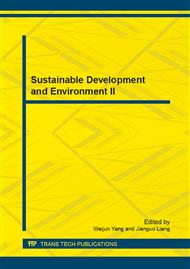p.190
p.195
p.199
p.204
p.208
p.214
p.221
p.226
p.231
Predict River Water Quality Based on Bayesian Hierarchical Model
Abstract:
According to many uncertain problems of river eutrophication, a Bayesian hierarchical model was established to predict water quality. We applied the hierarchical method to assess river water quality in an agricultural watershed in eastern China. The procedure followed was developing a hierarchical model relating eutrophication response - the level of chlorophyll (Chla). Through Principal Component Analysis (PCA), five factors strong related with Chla were selected to establish Bayesian hierarchical model to predict the water quality. Results showed that Bayesian hierarchical model was very realistic. Furthermore, in Bayesian perspective, predictions expressed as probabilities, rather than a single value, involving more uncertainty information, can be essential to environmental management and decision-making.
Info:
Periodical:
Pages:
208-213
Citation:
Online since:
September 2013
Authors:
Price:
Сopyright:
© 2013 Trans Tech Publications Ltd. All Rights Reserved
Share:
Citation:


